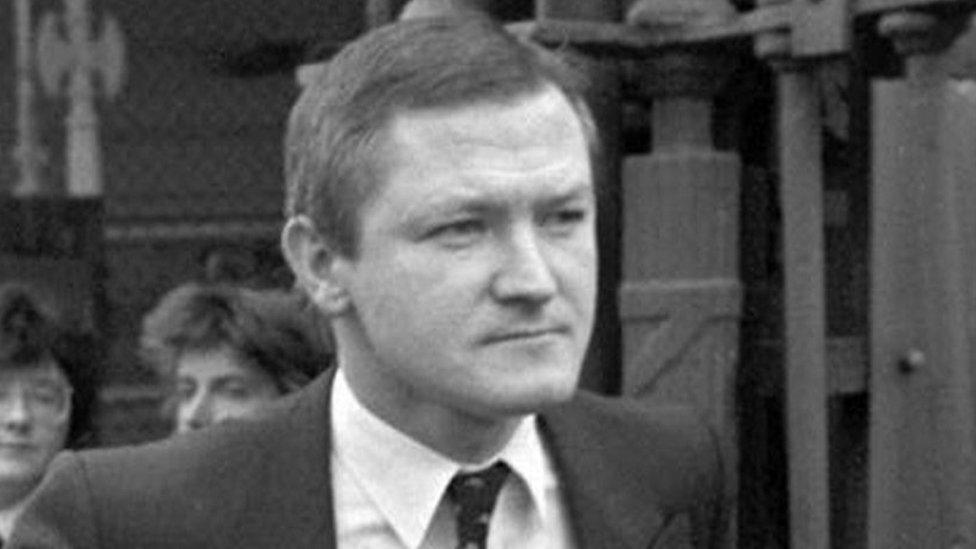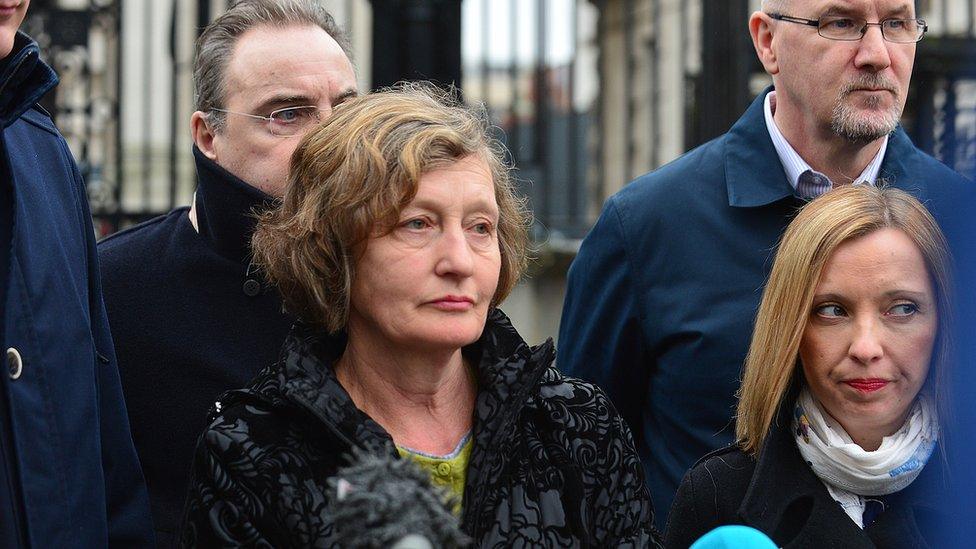Pat Finucane killing: Parties call for public inquiry
- Published

Pat Finucane, a 39-year-old Belfast solicitor, was shot dead in front of his wife and children in 1989
Four of Northern Ireland's political parties have united to call for a public inquiry into the 1989 murder of Pat Finucane.
The solicitor was 39 when he was shot dead by loyalist paramilitaries in his north Belfast home.
His family have campaigned ever since for a public inquiry to establish the full scale of security force collusion.
Sinn Féin, the SDLP, Alliance and the Greens have now sent a joint letter to NI Secretary Brandon Lewis.
It calls on Mr Lewis to "act in the public interest" and hold a public inquiry into the killing.
Mr Finucane was a high-profile solicitor who lived and worked in Belfast and convicted members of the IRA were among his clients.
He was killed in front of his wife and three children.
In October, Mr Lewis pledged to make a decision on whether or not to order an inquiry by the end of November.
He also apologised for the time taken to reach a final position - some of which could not be justified.
'Unanswered questions'
The joint letter from the parties states: "Thirty years on, it remains a matter of the utmost public interest that questions remain unanswered about who ordered the killing, about who knew what, and when.
"Only a public inquiry can now assist the Finucane family to get the truth about the scope and extent of state collusion into Pat's killing.
"Holding a public inquiry provides the British government with an opportunity to restore wider confidence in the rule of law and the administration of justice."
It was signed by Sinn Féin vice-president Michelle O'Neill, SDLP leader Colum Eastwood, Alliance deputy leader Stephen Farry and Green Party leader Clare Bailey.
Meanwhile, Mr Finucane's son John, the current Sinn Féin MP for North Belfast, has written to every member of parliament asking for their support.

Geraldine Finucane has for many years called for a public inquiry into her husband's murder
Mr Lewis's announcement in October that he would make a decision on the inquiry by the end of November came in a case brought by Mr Finucane's widow Geraldine over the government's delay in acting on a finding that his death was never properly investigated.
In February last year the Supreme Court held that previous probes into the murder did not meet human rights standards.
But the justices ruled out a public inquiry of the type demanded by the family and said it was for the state to decide "what form of investigation, if indeed any is now feasible, is required".

What is a public inquiry and why are they held?
Public inquiries are set up to uncover the truth following scandals or perceived injustices.
The test that must be satisfied in order to hold an inquiry is that it is of "public concern". , external
While often chaired by a judge, a public inquiry is not a court of law and cannot determine liability.
The aim is that public inquiries are independent.
The government decides whether to hold an inquiry in the first place, appoints its head, and has to agree what it is going to cover.
Inquiries can then make recommendations about how things should change but governments do not have to accept them.
An example of a public inquiry is the inquiry into the GP and serial killer Harold Shipman, chaired by Dame Janet Smith - a High Court judge.

- Published12 October 2020
